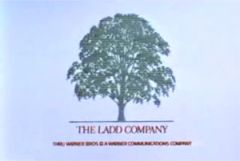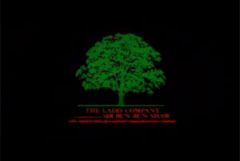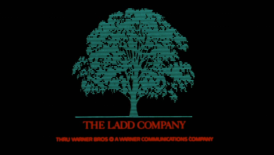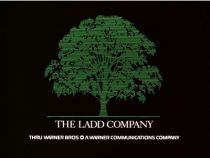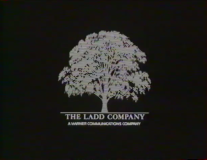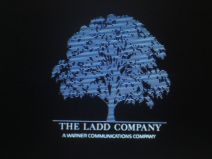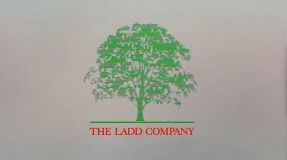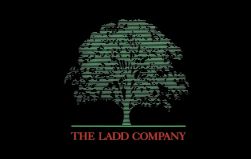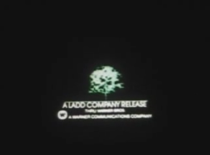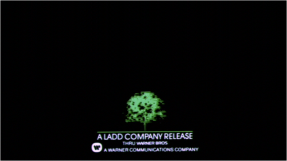The Ladd Company
Jump to navigation
Jump to search
Nicknames: "The Oak Tree", "Digital Tree", "Scanimate Tree"
Logo: On a white (or black) background, a green oak tree is etched from top to bottom with long glowing lines, and a single line is drawn for the bottom. When the tree is completely drawn out, red text that says "THE LADD COMPANY" appears underneath. A few seconds later, smaller text appears at the bottom that says "THRU WARNER BROS. (\\') A WARNER COMMUNICATIONS COMPANY".
Trivia: In an October 1979 <a class="external" href="http://news.google.com/newspapers?id=DpwcAAAAIBAJ&sjid=i2cEAAAAIBAJ&pg=6907,1549275&dq=the+ladd+company&hl=en" rel="nofollow" target="_blank">interview</a> with the Los Angeles Times and the Washington Post, two of its founders, Alan Ladd Jr. and Gareth Wigan, were asked about the relevance of the tree in the logo. Quoted Ladd: "The tree, well you can say it has a tie to the tree of life. Trees grow. Trees live. Trees do all kinds of things." Said Wigan: "They do everything movie companies do, except make movies. They last a long time. They're living things. They're strong. They provide protection, and fruit, and growth."
Variants:
FX/SFX: The tree being etched by glowing lines. It reeks of early computer effects.
Availability: Still intact at the beginning of any film produced by the company in the early 1980s, including Blade Runner, Night Shift, Police Academy (preceded on Encore by the 1998 WB logo), and The Right Stuff. There is no logo seen on Chariots of Fire, only a text notice. This also makes a surprising appearance on 1995'sThe Brady Bunch Movie and 1996's A Very Brady Sequel without the Warner byline, both distributed by Paramount. Also, a still version of this WB-bylineless logo can be seen at the end of 1995's Braveheart (distributed by Paramount) and 2007's Gone Baby Gone and 2005's An Unfinished Life, both distributed by Miramax.
Logo descriptions by SomerHimpson and others
Video captures courtesy of Peakpasha, BreadCrustCouncil, Tanaka Clark, and Logo Archive
Video captures courtesy of Peakpasha, BreadCrustCouncil, Tanaka Clark, and Logo Archive
Background: The Ladd Company was formed in 1979 by Alan Ladd Jr., Jay Kanter, and Gareth Wigan. Ladd was, prior to the studio's founding, the president of 20th Century Fox, and Kanter and Wigan were executives. As the alleged results of quarreling between Ladd and the studio higher-ups, the trio announced their intents to leave Fox when their contracts expired and form a production company to be financed by Warner Bros. Soon after they left Fox, the trio placed ads for the newly named "Ladd Company" in magazines like The Hollywood Reporter and Variety. They went on to produce movies such as Chariots of Fire, Braveheart, and Police Academy, which were all successful. However, the box-office failures of The Right Stuff (despite being a critical success), Once Upon a Time in America, and Twice Upon a Time sent the studio into oblivion, and on April 18, 1984, The Ladd Company and Warner Bros. parted ways, even though Warner still had 3 years left on Ladd's contract (and they did produce 2 movies in 1985: Police Academy 2: Their First Assignment and Doin' Time). In 1995, they entered a partnership with Paramount Pictures, producing Braveheart (which won an Academy Award for Best Picture), The Phantom, and A Very Brady Sequel. The deal only lasted one year. In 2005, they entered yet another deal, this time with Miramax Films. 2 films came out of this deal: An Unfinished Life and Gone Baby Gone. After the release of Gone Baby Gone in 2007, the studio ceased operations and is now defunct.
(September 26, 1980-October 19, 2007)
<iframe frameborder="0" height="167" src="http://wikifoundrytools.com/wiki/closinglogos/widget/unknown/35ba6c72363f2c20453e6e55ec1569a67286c7b0" width="296"></iframe><iframe frameborder="0" height="167" src="http://wikifoundrytools.com/wiki/closinglogos/widget/unknown/97a7ec0a197148819edab810e1016c4b6f49e44a" width="222"></iframe><iframe frameborder="0" height="167" src="http://wikifoundrytools.com/wiki/closinglogos/widget/unknown/d6ae19dfcacc2d7dfaf05bdfbfd0a94a356ba276" width="296"></iframe><iframe frameborder="0" height="167" src="http://wikifoundrytools.com/wiki/closinglogos/widget/unknown/5704d8603a2f68412b6f6427343691a3ac7a1702" width="296"></iframe><iframe frameborder="0" height="167" src="http://wikifoundrytools.com/wiki/closinglogos/widget/unknown/d3e9e05be445173484980637eed7ac7025edeac7" width="296"></iframe><iframe frameborder="0" height="167" src="http://wikifoundrytools.com/wiki/closinglogos/widget/unknown/7ed86a2e6fff36a19087af98dd9947ad35c643dc" width="296"></iframe>
Nicknames: "The Oak Tree", "Digital Tree", "Scanimate Tree"
Logo: On a white (or black) background, a green oak tree is etched from top to bottom with long glowing lines, and a single line is drawn for the bottom. When the tree is completely drawn out, red text that says "THE LADD COMPANY" appears underneath. A few seconds later, smaller text appears at the bottom that says "THRU WARNER BROS. (\\') A WARNER COMMUNICATIONS COMPANY".
Trivia: In an October 1979 <a class="external" href="http://news.google.com/newspapers?id=DpwcAAAAIBAJ&sjid=i2cEAAAAIBAJ&pg=6907,1549275&dq=the+ladd+company&hl=en" rel="nofollow" target="_blank">interview</a> with the Los Angeles Times and the Washington Post, two of its founders, Alan Ladd Jr. and Gareth Wigan, were asked about the relevance of the tree in the logo. Quoted Ladd: "The tree, well you can say it has a tie to the tree of life. Trees grow. Trees live. Trees do all kinds of things." Said Wigan: "They do everything movie companies do, except make movies. They last a long time. They're living things. They're strong. They provide protection, and fruit, and growth."
Variants:
- On Blade Runner, the logo is on a black background, and also contains a credit for Sir Run Run Shaw. This credit appeared separately from the logo (on a black background after the logo with the ending portion of the fanfare) on FX and AMC's prints of the film. The workprint of the film features the logo on a white background.
- A version of this logo also with a black background, but without the Sir Run Run Shaw credit, was seen on the film Twice Upon a Time.
- On The Right Stuff, the oak tree is colored in blue, the text is in white, and the byline reads A WARNER COMMUNICATIONS COMPANY in white. The French version had the tree completely white.
- On the trailers for films, the oak tree is small, the text reads A LADD COMPANY RELEASE in white, and the byline is in white.
- The Brady Bunch Movie and A Very Brady Sequel has a sped-up version of the logo, without the Warner byline since Paramount released these two films.
- On the trailer for Five Days One Summer, the text (including the byline) is in white.
- Depending on the film quality, the tree's color would be anywhere from pale green to white.
FX/SFX: The tree being etched by glowing lines. It reeks of early computer effects.
Music/Sounds: A gentle-sounding orchestral horn fanfare written by John Williams. This logo was also silent on some films.
Availability: Still intact at the beginning of any film produced by the company in the early 1980s, including Blade Runner, Night Shift, Police Academy (preceded on Encore by the 1998 WB logo), and The Right Stuff. There is no logo seen on Chariots of Fire, only a text notice. This also makes a surprising appearance on 1995'sThe Brady Bunch Movie and 1996's A Very Brady Sequel without the Warner byline, both distributed by Paramount. Also, a still version of this WB-bylineless logo can be seen at the end of 1995's Braveheart (distributed by Paramount) and 2007's Gone Baby Gone and 2005's An Unfinished Life, both distributed by Miramax.
Editor's Note: None.
